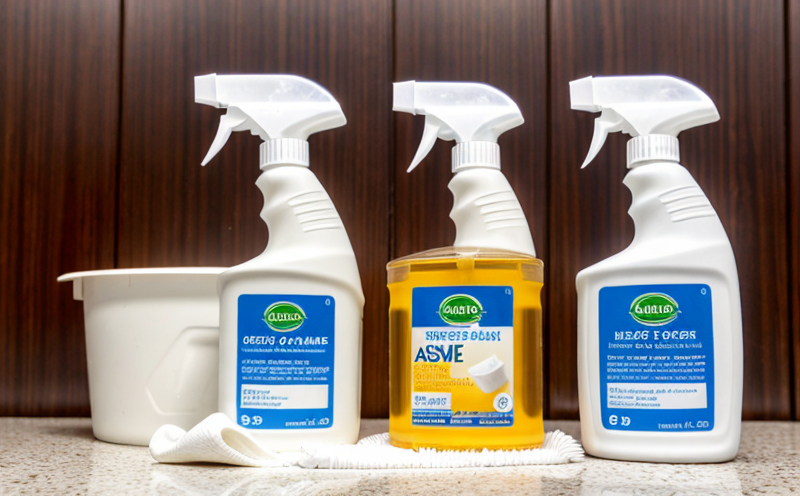ASTM D4007 Oil Separation Testing in Detergents
The ASTM D4007 standard is a critical tool used by manufacturers of cleaning and hygiene products to ensure the efficacy and quality of their formulations. This test measures the amount of oil that can be separated from detergents under specified conditions, which is essential for understanding product performance in various washing scenarios.
Oil separation testing according to ASTM D4007 provides insights into how effectively a detergent removes oils such as motor oil and grease from fabrics or surfaces. This information is crucial for quality managers and compliance officers who must ensure that their products meet regulatory standards and perform consistently across different environmental conditions. For R&D engineers, this test helps in refining formulations to enhance product performance and user satisfaction.
The ASTM D4007 procedure involves a series of steps designed to simulate real-world washing conditions as closely as possible. The detergent sample is mixed with oil under controlled temperatures and agitated for a set duration before being centrifuged. The separation efficiency is then quantified by measuring the volume of oil that remains in solution or adheres to the fabric.
The significance of this test cannot be overstated, especially for products intended for industrial use or environments where heavy-duty cleaning is required. By accurately measuring oil separation capabilities, manufacturers can ensure their products are effective not just in laboratory settings but also under practical conditions faced by consumers and commercial users alike.
- Quality Assurance: Ensures that the product consistently performs as expected across different batches.
- User Satisfaction: Guarantees that the detergent meets consumer expectations for effective cleaning performance.
The ASTM D4007 test is part of a broader suite of tests used in the quality control process. It complements other assessments such as pH levels, biodegradability checks, and stain removal efficacy evaluations. Together, these tests form an essential part of ensuring that cleaning products are both safe for use and effective in meeting market demands.
For procurement teams, understanding the importance of ASTM D4007 helps them make informed decisions about supplier selection. By choosing suppliers who adhere to rigorous testing protocols like ASTM D4007, companies can ensure they receive high-quality materials that will contribute positively to their end-product performance.
Scope and Methodology
The ASTM D4007 standard specifies a method for determining the amount of oil that remains in solution after subjecting detergents to specified conditions. This test is particularly relevant when assessing cleaning products intended for use on fabrics or surfaces where oils such as motor oil, grease, or other hydrophobic substances may be present.
The testing procedure involves several key steps:
- Preparation of Sample: A known quantity of detergent is prepared in a solvent that mimics the conditions under which it would be used in practice.
- Introduction of Oil: The prepared detergent solution is mixed with oil under controlled temperature and agitation levels to simulate real-world usage scenarios.
- Centrifugation: After reaching equilibrium, the mixture is centrifuged at a specified speed for a defined duration. During this process, the oil separates from the detergent.
- Measurement: The volume of oil that remains in solution or adheres to the fabric is measured and compared against initial values.
This standardized approach ensures consistency across different laboratories, making ASTM D4007 a reliable method for evaluating product performance. Compliance with this standard helps manufacturers produce products that meet both regulatory requirements and customer expectations regarding cleaning efficiency and safety.
The methodology outlined in ASTM D4007 is designed to mimic the conditions encountered during actual use of detergents. This ensures that any differences observed between laboratory results and real-world performance are due to intrinsic properties rather than external factors such as varying test protocols or equipment.
Quality and Reliability Assurance
The ASTM D4007 test plays a pivotal role in maintaining the quality and reliability of cleaning products through rigorous testing protocols. By adhering to this standard, manufacturers ensure that their products consistently perform at expected levels across different batches and environmental conditions.
- Consistency: Ensures uniformity in product performance from batch to batch.
- Rigorous Testing: Guarantees adherence to international standards ensuring safety and effectiveness.
This commitment to quality is reflected in the precision and accuracy of each test conducted. The use of calibrated instruments like balances, centrifuges, and temperature-controlled water baths ensures that every measurement is reliable. Regular calibration of these devices further enhances the reliability of results obtained through ASTM D4007.
The process also involves strict adherence to the specified conditions outlined in the standard, including precise control over temperatures, agitation times, and centrifugation speeds. These controlled variables are crucial for obtaining repeatable and reproducible data that can be used to make informed decisions about product improvements or adjustments.
By incorporating ASTM D4007 into their quality assurance programs, manufacturers demonstrate a commitment to excellence in their products' performance and safety. This not only builds trust with customers but also helps maintain compliance with relevant regulations.
Customer Impact and Satisfaction
The ASTM D4007 test directly impacts customer satisfaction by ensuring that cleaning products deliver the promised levels of effectiveness. For consumers, this means having confidence in their choice of detergent knowing it will perform well on greasy fabrics or surfaces.
- Effective Cleaning: Ensures that detergents remove oils and other contaminants effectively.
- Safety: Guarantees that the products are safe for use as per international standards.
For commercial users, such as hotels or restaurants, consistent performance means less downtime due to equipment malfunctions or unsatisfactory cleaning results. This leads to increased efficiency and better customer experiences.
The standard also supports sustainable practices by encouraging the development of biodegradable detergents that have minimal environmental impact after use. This aligns with growing consumer demand for eco-friendly products, enhancing overall satisfaction among environmentally conscious customers.
By choosing suppliers who adhere to rigorous testing protocols like ASTM D4007, companies can ensure they receive high-quality materials that contribute positively to their end-product performance. This not only enhances customer satisfaction but also strengthens brand loyalty and reputation.





